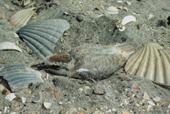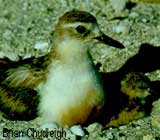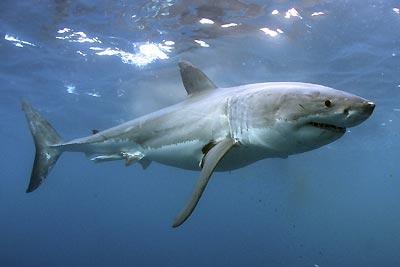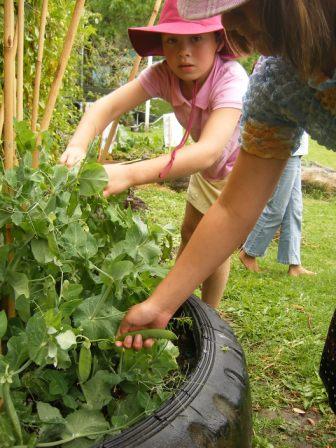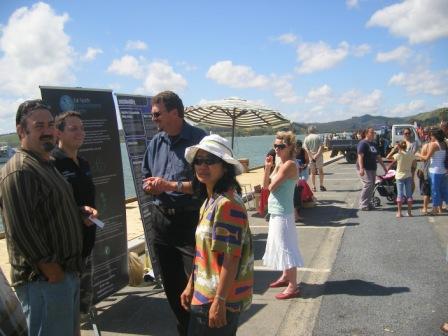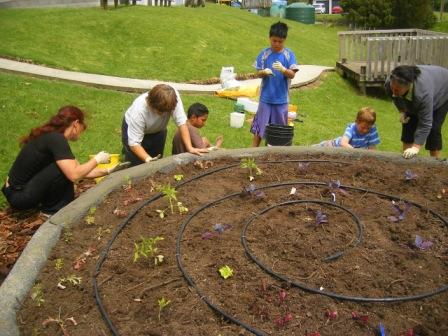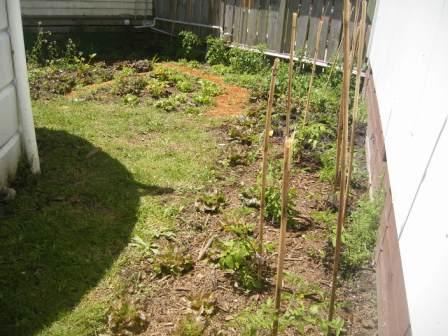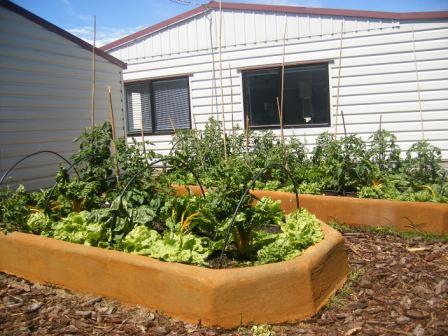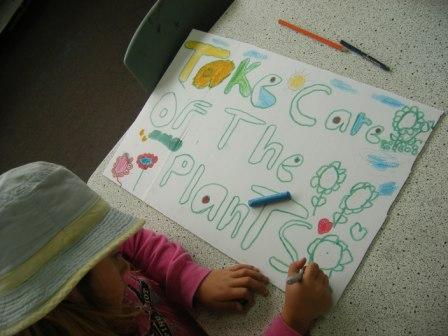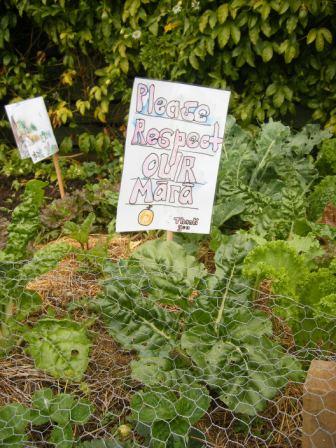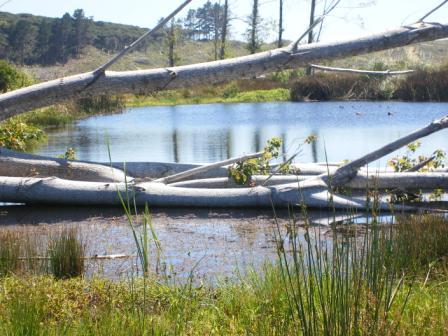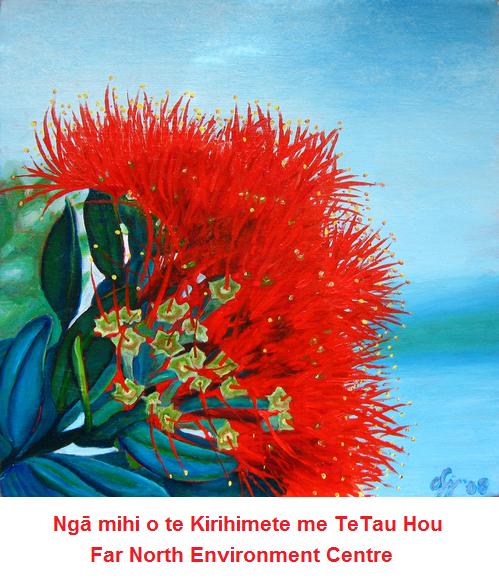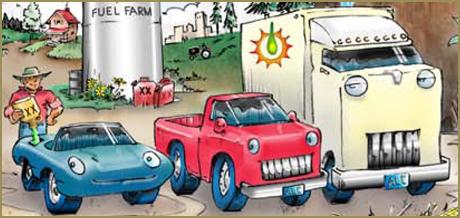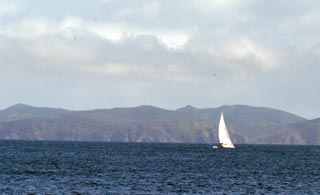PANUI DEC 2008
The last two months have seen the Environment Centre consolidating its work in the community with the continuation of school visits to Ahipara, Pukepoto and Kohukohu Primary Schools as well as engaging with the Department of Conservation to drive projects at Tokerau Beach and a wetland area near Waiharara.
Soozee, with tireless support from Anna (our partner at Te Oranga), has been very busy ensuring that the school gardens are well underway before the weather gets too hot and dry. Seeing the children enjoying the fruits of their labours has been fabulous!
Young gardeners discovering fresh peas at Kohukohu School
Progress has been made on the community nursery - Te Tuia - in Melba Street, with volunteer Lyall putting in the hard yards there. Any volunteers out there who would like to lend a hand are very welcome to cruise in to the nursery and talk to Lyall about what they can do.
All this organic garden work has kept Soozee out and about in the community. Meanwhile Richard has been busy setting up the home 'ecological footprint' audits for the Sustainable Living Activation Programme and there will be a huge burst of activity on these in the New Year, so if you haven't already signed up for one, now is your chance! Just click here to visit our website to find out more, and to sign up.
Evan and Clara, Northtec horticulture tutors, at the opening of the Mangonui Waterfront, promoting the Paradise Community Gardens, while Richard solicits for SLA
SCHOOL AND COMMUNITY GARDENS
As reported in the October Panui, the organic food gardens project was given an unexpected boost when we got the word from Northtec that there was ACE funding available to run Organiponico workshops in schools and the community. The 6 metre bed constructed as a joint project with CBEC outside our office has provided some welcome fresh greens - and if anyone is wondering why it's looking a bit wild at the moment, yes we are deliberately allowing some plants to go to seed so we will have plenty of rocket, coriander and chicory seed for further sowings!
Round Organiponico Bed at Pukepoto School
Workshops were also promptly organised for Pukepoto and Ahipara schools with participants from Northtec's Mangonui horticulture course and the Melba Street Community Nursery - Te Tuia. The caretakers at each of the schools and a number of local volunteers pitched in, sharing the mahi to construct twin rectangular beds at Ahipara and a round bed at Pukepoto. The children totally enjoyed being involved with applying the finishing touches, i.e. adding a smooth plaster to the outside of the walls and brushing on the oxide stain that gives the concrete an adobe-look finish. Vegie seedlings raised by the children were ready to go into the new beds which were soon filled. The Organiponico system proved its worth as the plants took off at a rate of knots, as can be seen in these pictures from Ahipara. The first plantings were into beds dug direct in the ground and, though these had compost and sheep pellets to boost fertility, the plants were soon outstripped by the later plantings in the Organiponico beds which had the advantage of deep, loose soil and drip irrigation.
The first garden planted by the students at Ahipara School this Spring
Organiponico Beds at Ahipara School
Unfortunately further raised beds were put on hold while funding issues were sorted, but there was plenty for the schools to get on with - the children learning about plant nutrients, organic pest control and ongoing care for their gardens like making use of grass clippings or hay as mulch to conserve moisture through the summer.
Young Gardener at Pukepoto School creates Protective Signage
Garden Communication at Kohukohu School
Plans to roll out the Organic Food Gardens Programme to more Far North schools are dependent on gaining more funding but we will continue to have contact with the schools regardless. A number of schools have expressed interest and the Environment Centre is looking at the most practical means to support schools in establishing gardens as well as providing a structured programme covering related environmental topics. This will include involving the children in projects such as Weedbusters on the dunes of Tokerau Beach and the rehabilitation of a dune lake/wetland system on the Aupouri Peninsular.
ACE funding has been approved for the construction of Organiponico beds during the first half of 2009 and we are currently co-ordinating the arrangements to build these on 18 sites - mainly schools plus some marae and community gardens. The Conservation Corps will be involved in some of these workshops as part of their programme of learning, and there will be ample opportunity for anyone with an interest in gaining the skills to build these very effective garden beds. Dates and venues will be posted on the website as soon as they are confirmed, at which stage participants can enrol for the workshops.
MANAWHENUA CHALLENGE
Taitokerau Organic Producers (TOPIS) are running the Manawhenua Challenge for young gardeners again in 2009 and are inviting gardeners
WEEDBUSTERS, TOKERAU BEACH
A number of meetings have been held with DOC staff and the Beachcare group at Tokerau in preparation for our new role in a Weedbusters project at a DOC reserve at the northern end of Tokerau Beach, Karikari.
This low dune area is fairly over-run with exotic weeds like gorse and cape honey flower (Melianthus major) which need dealing to before native plants can regrow.
The project will involve a number of weekend ‘Community Orientation Days' plus six bi-monthly workdays.
The first Orientation day will be held on January 10 2009, from 12 noon to 4 pm and will be run in conjunction with a Safe Beach Driving Day being hosted by the Northland Regional Council.
Staff and volunteers will meet at the FNDC Reserve which is at the end of Melissa Road, opposite the Tokerau Beach Motor Camp. Our Weedbuster facilitator, Richard Lees, will be on hand to outline the programme and demonstrate cutting and painting techniques to deal with the bigger weed species. There will also be an opportunity to gather seed from Pingao and Spinifex plants. These will be propagated at Te Tuia Community Nursery (Melba Street, Kaitaia) and eventually planted back to the dunes.
This is an exciting new project for the Environment Centre that will involve us in some hands on habitat restoration and allow us to engage with a range of agencies and community groups. We are particularly looking forward to involving local schoolchildren, once the more prickly and toxic phase of the weedbusting is out of the way!
DUNE LAKE AND WETLAND RESTORATION
The other major project currently in the planning stage is a dune lake/wetland restoration project on the Aupouri Peninsular. Wetlands are the most reduced type of habitat globally, and we are very fortunate to have some unique examples in our district. Again, this will be a multi-agency undertaking, with the Environment Centre driving the project as main facilitator. The area under consideration is home to the Northland variant of the Black Mudfish, a host of birds including Bittern, and a good diversity of plant species, many of which are no doubt yet to be catalogued.
Initial work will be carried out in partnership with DOC and will call on the expertise of naturalists connected with the department, but later in the year we hope to do wananga and working bees involving schools, community groups, hapu and any other interested volunteers. Events relating to this restoration project will be posted on the website.
Wetalnd area, Aupouri Penisular
FOOD CO-OP
Progress on the setting up of the Food Co-op has been held up somewhat with everyone getting caught up in end-of-year busyness, but we should have it up and running early in the New Year. Please contact Soozee if you are interested in becoming a member and you will be put on an email list and forwarded the catalogues we have so far. The plan is to add 10% to the cost of the order and freight and this will cover administration for the monthly bulk order.
WANTED!
Does anyone have a serviceable old sofa they would like to donate to the office to make the Environment Centre more 'visitor -friendly'?
LAST BUT NOT LEAST:
HAVE A JOYFUL AND SAFE FESTIVE SEASON!!
Be Green, be Seen and be Merry!

